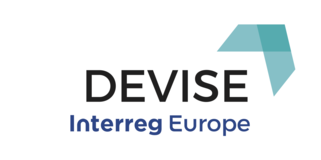DEVISE is arriving to the end. After having exchanged good practices and experiences, inspired each other within the partnership and developed 10 Regional Action Plans, it's time to review the changes achieved in each of the policy instruments thanks to this project. This week, we speak with Gemma Scarlett from Derry City and Strabane District Council in Northern Ireland.
What policy instrument were you addressing when the DEVISE project commenced? Why?
The policy instrument being addressed by DSCDC at the commencement of the project was ‘Priority Axis 2 which corresponds to the thematic objective: Enhancing the competitiveness of small and medium-sized enterprises.’ The policy instrument aligned with the transfer of economic functions that took place as part of the reform of Local Government in NI. The 11 Local Councils, among Derry City and Strabane District Council (DCSDC) is included, are the beneficiaries of this funding which is administered through Invest NI. The LED activity has one primary target which is the creation of jobs. This can be achieved either through start-up or business growth activity with particular focus on the micro and small business base, and linked directly with the output of the existing Business Boost programme, and the new LED funded Business Innovation and Growth (BIG) Programme due to commence during the lifetime of the DEVISE programme linked directly to this measure.
What has specifically changed in your policies and your region thanks to the project?
Learning and consultation through DEVISE with stakeholders, delivery partners and SMEs in conjuction with best practice learning in period 3 and 4 resulted in the inclusion of the work packages 'Digital Transformation Action Plan (DTAP)' and 'Digital Tech Enterprise Support' (DTES) under the Business Innovation and Growth (BIG) Programme, which are direct policy changes. This was achieved following consultation approval with statutory agencies and funding providers for the implementation of the work packages within the programme; it was approved and launched in September 2020.
The work packages within the Action Plan and delivered via the BIG programme differ from that of previously funded programmes inc. Business Boost and NIBSUP which are broad in focus. The work packages seek to provide specific support across a number of key themes inc. Digital and Innovation Growth, Export Competitiveness and Creating Jobs.
Which good practices have inspired these changes?
The DTAP work package is a new area of support not previously provided to businesses and has been included based on best practice learning gained through the Apollo Programme (Laval, France) and Industry 4.0 Audits (Cantabria, Spain). Additionally, the DTES work package delivery elements have been re-focused based on best practice learning gained through DENDATICS (San Sebastian, Spain) and Apollo Programme (Laval, France). This is to ensure that there will be no duplication to similar support areas.
Funding support is an additional work plan within the BIG programme, which is part of the DTAP delivery objectives to assist with identifying support to meet the policy change objectives of digital innovation, growth, export, competitiveness and job creation through the implementation of digital processes and infrastructure for SMEs. Inclusion of this work plan in the development of the action plan delivery is based on best practice learning gained through the DENDATICS (San Sebastian, Spain) mainly how the programme identified, developed and delivered funding support to SMEs
Would you like to highlight any other improvements?
DCSDC secured funding for the Business Innovation and Growth Programme (the overarching programme in which the actions will be delivered) which was as a result of good practice learning, partner region best practices, workshops and meetings with stakeholders. DCSDC have applied the knowledge acquired through good practices and exchange activities its action plan.











